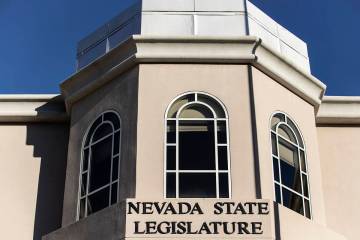COMMENTARY: Legal pot will present many challenges for Nevada
Implementing fully legalized marijuana in Nevada should be tough and presents challenges.
Nevada’s nascent medical marijuana program is run by the state Department of Health and Human Services. Pursuant to the initiative voters passed last November, however, Nevada’s new recreational marijuana program will be run by a different agency, the Department of Taxation, which has no institutional experience in administering a marijuana program.
Under the initiative, the department is given broad powers to set marijuana wholesale prices; establish requirements and issue licenses for five different types of marijuana licensees; do background checks; and set requirements for packaging, testing, record keeping, signage, taxes and fees. The powers and duties of the department are exhaustively listed in the initiative and cover two pages. This monumental undertaking requires the department to draft all regulations and “staff up” by Jan. 1.
Implementing marijuana legalization in Colorado required the hiring of more than 50 full-time employees in that state’s Department of Revenue and a total of 120 new hires at all levels of government. Colorado struggled but met its initiative-imposed one year deadline on retail sales. Similarly, California “promises to be operational” by January. But the legislature in Massachusetts, citing complications, voted to delay the state’s marijuana deadline for six months to July 1 , 2018.
Nevada’s Department of Taxation has just now hired four employees to draft regulations and administer the state’s recreational marijuana program. It plans to hire an additional 12 individuals in July. Meanwhile, the department has stated an intention for “early start” retail sales to begin July 1 using “temporary regulations.” Pressure from the commercial marijuana industry and state officials to get retail sales started immediately is intense. Retail sales means profits for the industry and revenue for the state to recover costs incurred in “staffing up.”
Nevada’s new marijuana regulator has a duty is to protect the health and safety of Nevadans. Will a staff of 16 employees be able to draft tough, comprehensive regulations limiting advertising, pot potency, restricting edibles and prescribing packaging, among their myriad duties? Colorado required more than three times as many full-time employees to administer its marijuana start-up program. At a time when Massachusetts is postponing its “start date,” Nevada is advancing ours. Will Nevadans be protected by adequate regulation and enforcement?
Gov. Brian Sandoval proposes a new retail excise tax of 10 percent on marijuana retail sales coupled with the 15 percent wholesale tax provided for in the initiative. Under Gov. Sandoval’s proposal, a Clark County retail marijuana purchaser would absorb a combined wholesale and retail tax of 25 percent plus a local sales tax of 8.15 percent. This total tax of 33.15 percent would result in a large black market.
Colorado is actually reducing its retail marijuana tax from 10 percent to 8 percent effective in July after a state-sponsored study substantiated the black-market effect. Gov. Sandoval’s retail marijuana tax revenue forecast of $50 million annually is also extremely optimistic based on the Colorado experience. First-year marijuana tax revenues there were barely half the amount projected.
Marijuana remains illegal under the federal Controlled Substances Act, classified a Schedule 1 drug and found to be without valid medicinal applications and a high potential for abuse. The Obama administration’s DEA director re-affirmed that classification last August.
President Trump’s new attorney general, Jeff Sessions, has been an outspoken critic of legalizing marijuana. The only thing keeping federal agents from enforcing federal law is the 2013 Justice Department “Cole memorandum” making marijuana a low priority and permitting localities and states to enforce their own laws. Attorney General Sessions has full authority to withdraw that memorandum and pursue a different policy.
Nevada policymakers should not get addicted to the “pot of gold” lure of marijuana tax revenues. Marijuana taxes will not likely cover the full costs of legalization — including regulation, enforcement, public health and safety and substance abuse treatment.
Jim Hartman, an attorney writing from Genoa, is president of Nevadans for a Responsible Drug Policy.




























